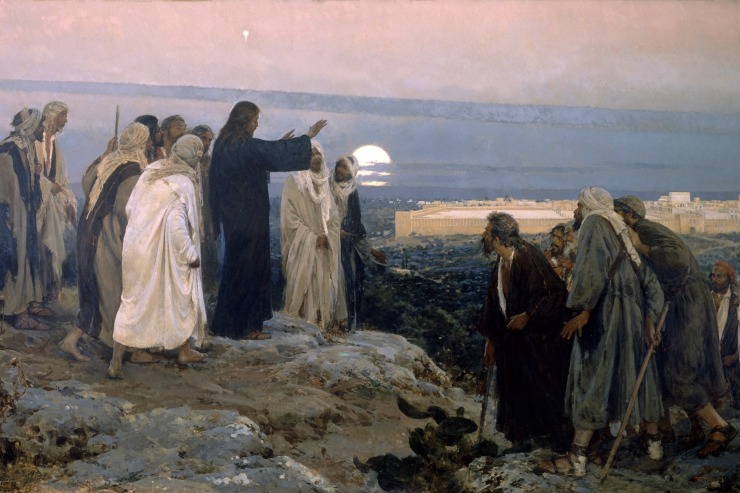Consolation in the End Times
by Joannie Watson | November 27, 2020 12:04 am
 [1]
[1]Detail of “Fleet Super Illam” by Enrique Simonet
“God will have the last word.”
The readings this week, as we close the liturgical year, are apocalyptic. This should not cause us anxiety or apprehension. If we are following Christ, these readings should give us great consolation, particularly today’s Gospel.
Today’s Gospel[2] might be a bit confusing. Christ seems to be warning the people about the end of the world, but then says that some of them will experience it. Did Christ get it wrong? Or did Luke misunderstand?
Christ is speaking to the people not only about the end of the world, but also the end of their world: the destruction of the Temple.
While in today’s Gospel, Luke presents Jesus speaking in the Temple, Matthew situates this same discourse on the Mount of Olives. The Mount of Olives sits across the Kidron Valley from the city of David, so as Jesus is teaching, he is sitting facing the Temple. According to the prophets, the Messiah would come to the Mount of Olives, entering the city from the East (Ex 11:17-23, Zech 14:4). He would come to gather the tribes, reunite the kingdom, and rebuild the Temple.
Instead, the Messiah that day was speaking about the destruction of the Temple, which would occur within a generation of many of his listeners. Why? Because He would be rejected a few days later, and His Body, the New Temple, would be destroyed. He was not just facing the Temple while he taught. He was facing Golgotha.
To understand Jesus’ discourse in Matthew 24 and Luke 21, which we have been hearing at daily Mass this week, we must put ourselves in the place of his Jewish listeners. The destruction of the Temple would have been the end of the world to them. The Temple was everything. It was an outward manifestation of the covenant with David. The Temple gave them their identity as a people. It was the place God dwelt with them, where heaven met earth. Even though the Ark was no longer in the Holy of Holies, despite the differences that existed in the Second Temple period from the time of Solomon, the destruction of the Temple would have been devastating. The Temple was not just the center of the world, the place where heaven met earth, but a microcosm of the world.
In addition, the atrocities experienced in 70 AD during the siege of Jerusalem must have felt like the end of the world. The siege began shortly before Passover and lasted five months. After months of starvation in the city, the Temple was eventually overcome and burned. As the Jews rushed in to save it, Josephus writes:
“Most of the slain were peaceful citizens, weak and unarmed, and they were butchered where they were caught. The heap of corpses mounted higher and higher about the altar; a stream of blood flowed down the Temple’s steps, and the bodies of those slain at the top slipped to the bottom. …
While the Temple was ablaze, the attackers plundered it, and countless people who were caught by them were slaughtered. There was no pity for age and no regard was accorded rank; children and old men, laymen and priests, alike were butchered; every class was pursued and crushed in the grip of war, whether they cried out for mercy or offered resistance.
Through the roar of the flames streaming far and wide, the groans of the falling victims were heard; such was the height of the hill and the magnitude of the blazing pile that the entire city seemed to be ablaze; and the noise – nothing more deafening and frightening could be imagined.”
It must have seemed as if the world was ending.
There will always be people who say the end is coming. In every age, there is war and famine and apostasy. There are always moments in history when it seems like life could not get worse. I have begun to hear it again in 2020. After what we have endured this year, perhaps Jesus is coming. Maybe these are signs of the Second Coming.
Maybe they are, although I think we should be careful not to forget that our world has seen far worse than what we are experiencing now. But even if these are signs of the end, there is no reason to be anxious.
Jesus’ words today should be a consolation to us. “Heaven and earth will pass away, but my words will not pass away.”
Jesus’ words remain. In the midst of the siege of Jerusalem in 70 AD, His words remained. During the darkness of the Black Death, when it seemed that all of Europe was going to die, His words remained. In the horrors of the last century, that saw the death of 45 million Chinese under Mao’s Communist rule, the genocides in Cambodia, Armenia, and Rwanda, and Stalin’s forced starvation of up to 12 million Ukrainians, His words remained.
It is not that evil will not happen. It is that it will not have the last word.
God will have the last word. His words will remain. Not only his words of prophecy, but his words of consolation; not only his words of judgment, but his words of mercy.
As we begin to celebrate the great season of Advent, let us pray with the early Christians: Maranatha! May His coming, either at the end of the world, at the end of our lives, or on the altar every day at Mass be an occasion of peace and consolation.
Please help spread the Gospel! Share this article on Facebook and other social media.
- [Image]: https://www.integratedcatholiclife.org/wp-content/uploads/Enrique_Simonet_-_Flevit_super_illam_-_1892_detail.jpg
- Today’s Gospel: https://bible.usccb.org/bible/readings/112720.cfm
Source URL: https://integratedcatholiclife.org/2020/11/watson-consolation-in-the-end-times/